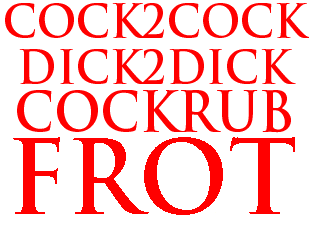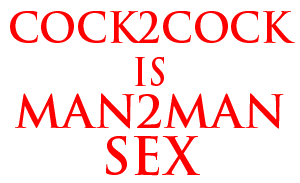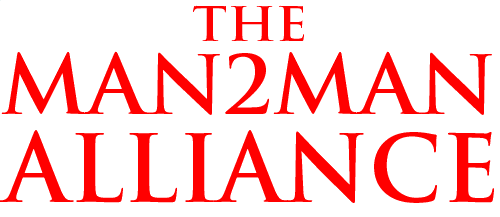




A moment of reflection for those who died in the Virginia Tech massacre
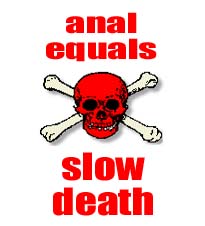





A moment of reflection for those who died in the Virginia Tech massacre

A moment of reflection for those who died in the Virginia Tech massacre
4-18-2007
I'd just like to take a moment out to pay my respects to those who died in the Virginia Tech massacre this past Monday and reflect on what it means for those of us here.
My thoughts and prayers are with the families of all those who lost loved ones in the shootings. I pray that God gives them the resolve to cope with such a tragic loss and continue to be fruitful and happy in their lives.
Of course, there are those whose thoughts weren't for the families first. There were those whose first thoughts were to disarm our society. There were those whose first thoughts were to celebrate the deaths. There were those who sought to make a spectacle of such a tragedy.
All of the above groups have one thing in common: they value life so little that the loss of it means nothing to them. They note it, acknowledge it, and move on with their agendas.
I'd like to think that this wasn't the case: that all Americans respected and revered life alike. That should be something we all share in common. Unfortunately, there exists a significant faction who look for ways to view any event as a method of increasing their own power and stature.
So once again the burden falls on us. We have to be the ones to go out and explain that there is a difference between violence and fighting. We have to be the ones who go out and explain that no real *masculine* man would perpetrate such a horrific act. We have to go out and explain that no man of faith would ever attack a room full of innocent, defenseless students to carry out God's will. And we have to explain, wherever we hear otherwise, that above all else, this was a tragic loss of human life and should not be exploited for any reason.
It is a sad day when the media in this country reacts to this kind of violence by claiming we should disarm ourselves. If this were a masculine, warrior society, we would be preparing our children to defend themselves against this type of attack in the future, so that the magnitude of loss will not be as great next time.
That is why it falls on us to explain these things to people. We are the masculine men. We are the warriors. We have to make the people who aren't understand.
I pray that we can do so soon.
Thank you.
Re: A moment of reflection for those who died in the Virginia Tech massacre
4-23-2007
Thank you Greg.
Greg:
We have to be the ones to go out and explain that there is a difference between violence and fighting.
That's right, there is.
And there's a difference between aggression and violence.
I think that many people conceive of the two as being on a continuum:
there's aggression, and it builds, and then you have violence.
In reality, the two, to my thinking at least, are usually discrete.
In other words, this:
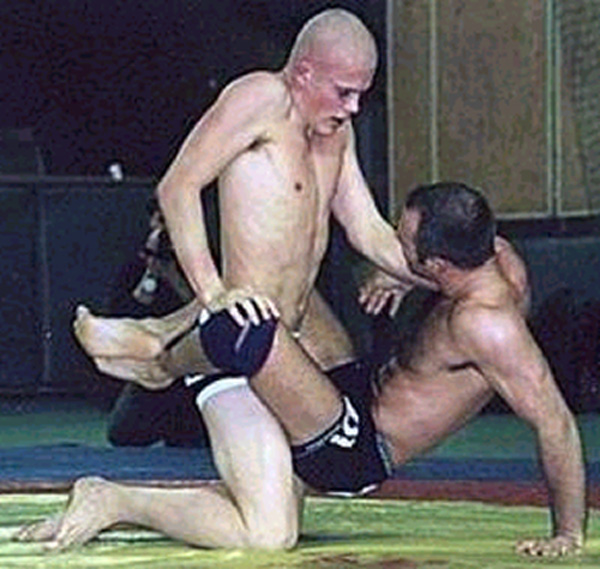
doesn't lead to this:
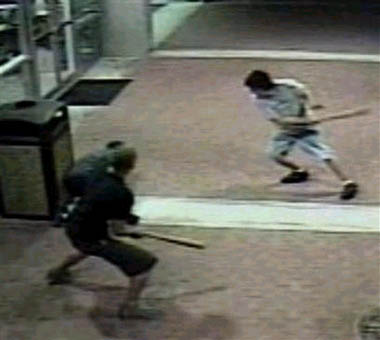
And you can see that with the Blacksburg shooter.
It's not like he went from being on the wrestling team to being a mass murderer.
Actually, he was a social isolate, apparently from early childhood on.
We don't know why, and we don't know if anyone could have helped him.
But what can we see is that he didn't take part in normal boyhood and adolescent aggressive activities.
What we in America often call "rough and tumble" and what my foreign friend calls "the roughs and toughs of life."
He didn't experience that.
Rather, he kept himself apart -- for whatever reason.
And in point of fact, and historically, getting kids involved in athletics, including wrestling and boxing, has been seen as a way of building character, teaching teamwork, and keeping them out of criminal activity.
When Patrick was teaching karate that was one of the principal goals of his dojo: to reach out to kids at risk for gang activity, and to involve them in karate instead.
And they most certainly were not allowed to do both.
They could be in a criminal gang; or they could learn a martial art.
Which is to say: they could be violent; or they could learn a controlled and disciplined form of aggression.
That was very attractive to those kids.
Not only did it take them out of the gangs and give them a new focus and a new peer group;
but it also meant that anyone who tried to bully one of the martial arts kids was taking on the entire dojo -- of seriously trained karate students.
And their teachers.
Not something to be undertaken lightly.
So, there's a big difference between normal and natural male aggression as it's expressed in the combat sports and even in schoolyard fist-fights; and criminal violence.
There are two elements which are normally not found in the fight sports, but which are present in most criminal violence:
1. Enmity or hate.
It's very rare for opposing fighters to have any sort of personal enmity or dislike of each other.
To the contrary, usually the two respect each other -- at the very least -- as fighters.
And often there's friendship between them.
And certainly there's a lot of camaraderie.
Here are some pix of UFC-style fighters at weigh-ins, which are always followed, traditionally, by the face-off.
In which the fighters are supposed to look very serious and very fierce.
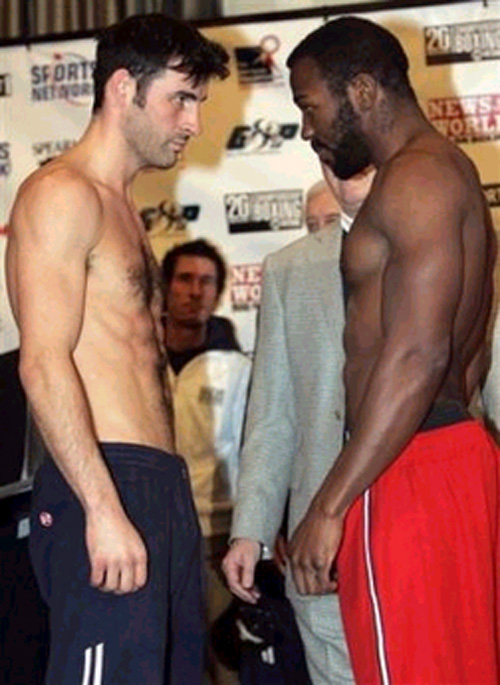
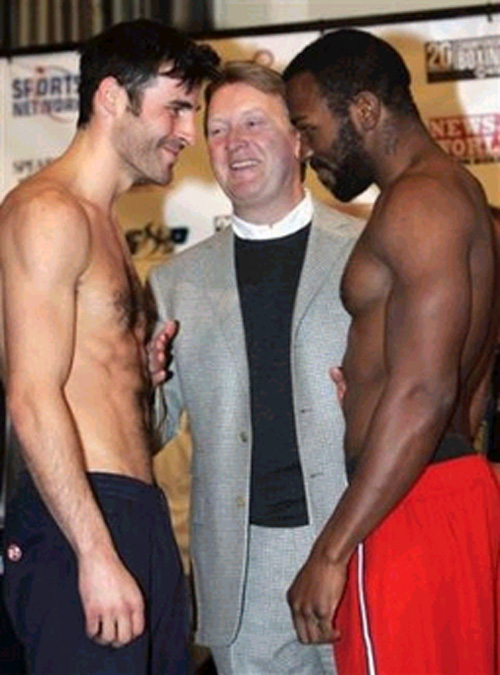
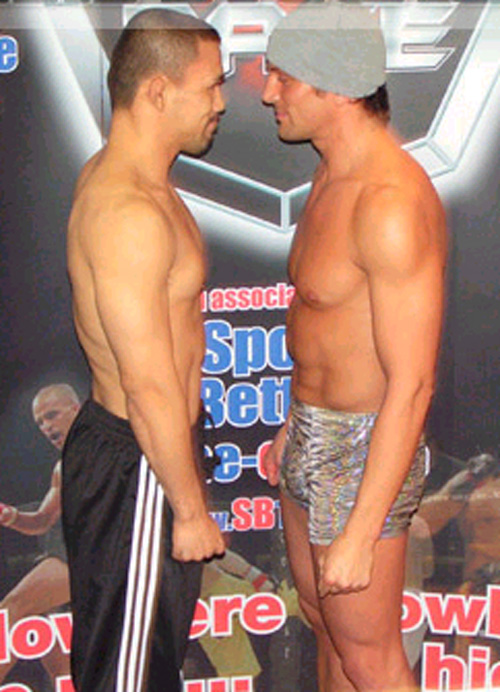
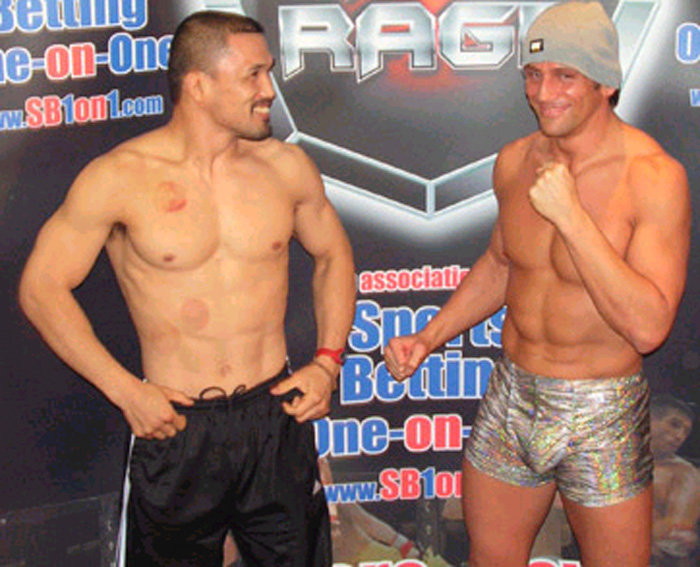
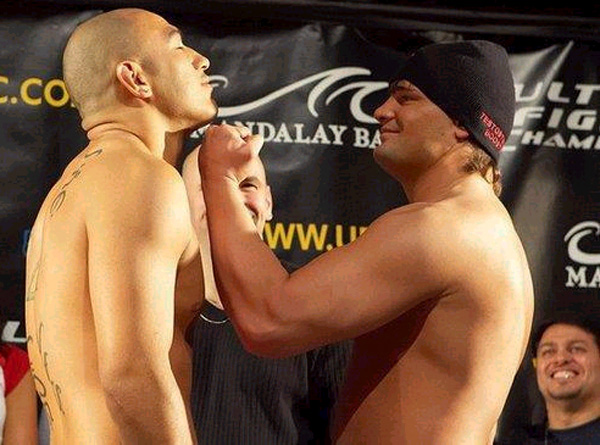
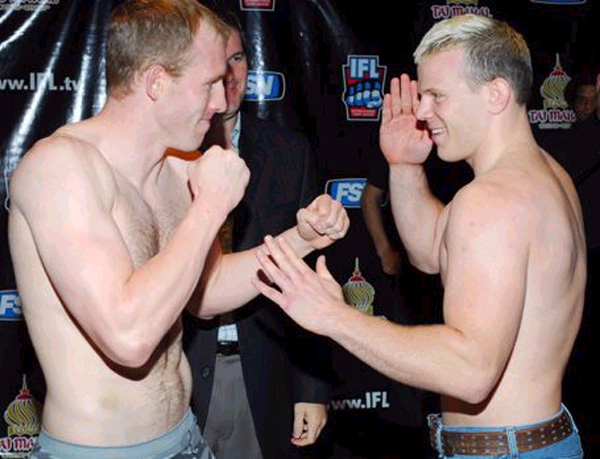
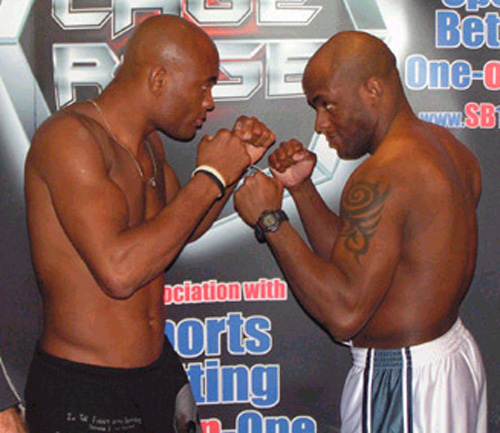
As you can see, these guys don't care about serious and fierce at the face-off.
Instead, they're having a good time -- fun.
And that's what the fight sports are about.
Fun.
People who don't understand that simply don't understand male aggression.
Further -- are men who are having fun while expressing their male aggression in this controlled and sanctioned way, which strengthens the bonds between and among men -- going to then turn around and be violent in another setting?
No.
2. Predation.
Criminals predate.
They victimize.
Homo homini lupus est, said the Roman playwright Plautus: Man is a wolf to man.
But fighters don't predate on each other.
Rather, they're matched in age and height and weight and degree of skill -- and they fight on that basis.
The criminal, by contrast, seeks a victim -- someone who by virtue of sex or size or age or inferior firepower he can bully and exploit.
In a fight sport, there are two guys who've volunteered to undertake a test of strength and skill.
With nothing between them.
No weapons.
Barely any clothes.
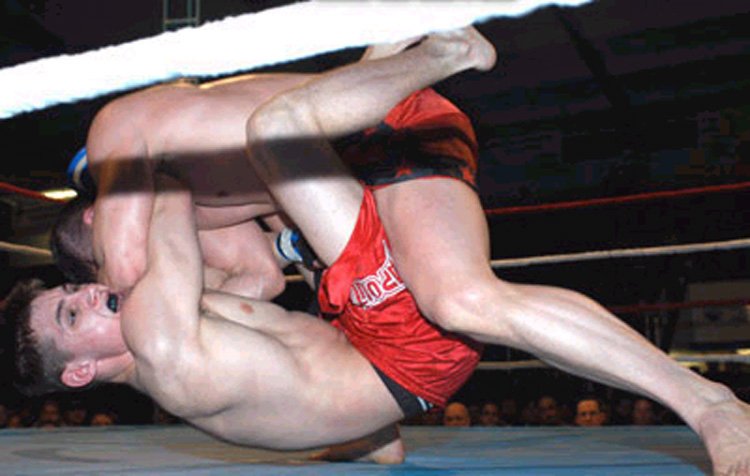
In many ancient cultures -- no clothes.
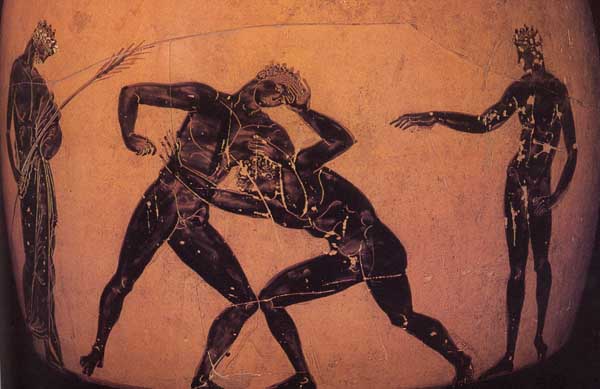
In a crime, there's a predator and a victim.
The victim is NOT a volunteer.
And the predator usually has a weapon.
Blacksburg is a truly horrific example of these elements of criminal violence.
The shooter was consumed with hate;
he set out to kill;
and of course those killed did not choose their fate.
So, as Greg says, there's a huge difference between violence and fighting.
Now there's also the question of resistance.
I mentioned that in the Patrick has been very ill post, and I want to talk about it again -- because it's really important.
At Blacksburg, as you can see from this NY Times account, resistance mattered.
In one instance, a group of students managed to barricade a door with their bodies.
The gunman shot through the door and wounded at least two of them.
But he wasn't able to get through the door.
So by resisting, they almost certainly saved their own lives and those of others in that classroom.
In addition, one of the wounded had had sufficient training that he knew to apply a tourniquet to his wound -- which it's said saved his life.
In another instance, that of the Rumanian Holocaust survivor, Liviu Librescu, Professor Librescu blocked the door with his own body and told his students to flee.
He took five bullets, but he bought time for at least some of his students to get away.
I was fortunate in my life to have been mentored by Holocaust survivors.
Many Holocaust survivors have said that to some degree survival was a matter of luck.
And it's important to understand that.
We don't want to blame the victims for failing to survive.
And we need to be clear -- the 32 victims were shot more than 100 times -- that's a lot of bullets.
But the people who mentored me had also learned that cooperation with an oppressor was fatal, and that's what they taught me.
They taught me not to cooperate.
That's one of the reasons I'm still alive.
Because when analism emerged, I wouldn't cooperate.
Professor Librescu died, but by refusing to cooperate, he saved the lives of his students, whom he cared about deeply.
And again, that's a lesson from the Holocaust.
Eichmann, the German bureaucrat in charge of the mass murder of the Jews, testified in Jerusalem that the Germans couldn't have done what they did without the cooperation of the non-Jewish and Jewish authorities.
Where Jews and / or non-Jews refused to cooperate, the Nazis had a hard time.
Non-cooperation is the reason that virtually all of the Danish Jews, most of the Bulgarian Jews, and almost 90% of the Italian Jews, survived.
So if you don't like it, don't cooperate with it.
Do NOT go along to get along -- because you and many others may die that way.
Greg:
We have to be the ones who go out and explain that no real *masculine* man would perpetrate such a horrific act.
That's right.
A naturally masculine man will not predate upon his fellow human beings.
Greg:
If this were a masculine, warrior society, we would be preparing our children to defend themselves against this type of attack in the future, so that the magnitude of loss will not be as great next time.
Right.
Many of the articles I've read in response to Blacksburg have talked about what institutions, such as universities and corporations, can do to protect their students and faculty and employees.
Which is fine so far as it goes.
But it also takes responsibility away from the individual -- and in a sense from society.
To the Greeks, the ability to fight -- both in the palestra and as a soldier -- was one of the key attributes of the citizen.
Here's Victor Davis Hanson, a classicist and expert on Greek warfare -- he's on the Reading List -- talking about ancient Greek attitudes:
War and the use of land are the building blocks of Aristotle's Politics and Plato's Republic. Both utopias assume that before man can speculate, contemplate, educate and argue, he must first figure out how to eat and how to fight. The soldier and the farmer may be forgotten or even despised in our own culture, but in the Greek mind agriculture and warfare were central to a workable society, in which both professions were to be controlled by a rational and egalitarian citizenry.
~ Hanson, The Wars of the Ancient Greeks
I was struck by this passage because in our society, as Hanson says, we've forgotten both how to farm and how to fight.
The soldier and the farmer -- and I would add the fighter -- may even be despised in our culture.
But fighting and farming are fundamental human activities.
As Hanson says, to the Greeks, war and agriculture "were to be controlled by a rational and egalitarian citizenry" -- who understood *first hand* what war and agriculture were about.
The Spartans for example were landed Warriors who had devised a constitutional government which conferred upon them equal rights -- and responsibilities -- in society.
They referred to each other as homoioi -- Equals.
The Equals had the right to participate in the political life of their city.
They could speak in the Assembly and they could run for and vote for the office of Ephor and for membership in the Gerousia -- the council of elders.
In addition, each Equal was provided, at birth, a plot of land on which to grow food;
and, from the age of seven forward, warrior training in the agoge.
Fighting and Food.
And the two things which an Equal was expected to do was provide food for his communal mess;
and fight.
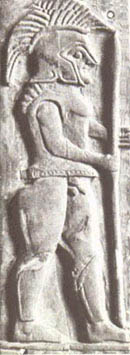 12345678910
12345678910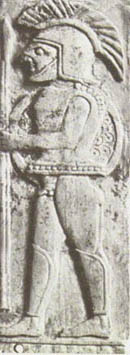
A man who failed in either of these duties lost his status as an Equal.
Which was very serious.
The US used to be a predominately agricultural country; and we used to have a citizen army.
We no longer do.
We have a professional army.
I think that's a mistake.
I think it's a huge mistake.
Citizens should know how -- and be required -- to fight.
Because that creates, per the Greeks, a "rational and egalitarian citizenry," a government of citizen-soldiers, who are up to the task of deciding when we should or should not go to war.
Interestingly, just as I was finishing this post, an article appeared on Yahoo about an American soldier who's complained that our fallen military have not been given the same degree of honor as those who died at Blacksburg:
Soldier: Honor troops like Va. Tech dead
By ALISA TANG, Associated Press Writer
Mon Apr 23, 2007
KABUL, Afghanistan - An Army sergeant complained in a rare opinion article that the U.S. flag flew at half-staff last week at the largest U.S. base in Afghanistan for those killed at Virginia Tech but the same honor is not given to fallen U.S. troops here and in Iraq.
In the article issued Monday by the public affairs office at Bagram military base north of Kabul, Sgt. Jim Wilt lamented that his comrades' deaths have become a mere blip on the TV screen, lacking the "shock factor" to be honored by the Stars and Stripes as the deaths at Virginia Tech were.
"I find it ironic that the flags were flown at half-staff for the young men and women who were killed at VT, yet it is never lowered for the death of a U.S. service member," Wilt wrote.
He noted that Bagram obeyed President Bush's order last week that all U.S. flags at federal locations be flown at half-staff through April 22 to honor 32 people killed at Virginia Tech by a 23-year-old student gunman who then killed himself.
"I think it is sad that we do not raise the bases' flag to half-staff when a member of our own task force dies," Wilt said.
...
If we don't honor our soldiers sufficiently, perhaps it's because we don't respect what they do.
The Greeks did.
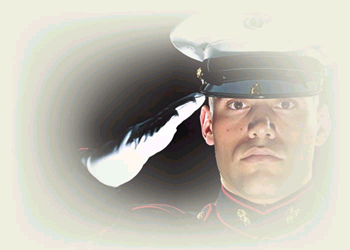
And in The Wars of the Ancient Greeks, Hanson points out how deeply the Greeks honored their fallen soldiers:
[T]here was also a widespread civic consciousness of the ultimate sacrifice of the citizens who fought. Funeral orations (epitaphoi) were public events. Corpses were normally collected, identified, and buried.
Often casualty lists - like the American memorial in Washington, DC to those lost in Indochina - were erected for public display, and the soldiers listed sequentially by the year in which they were killed. Private graves were adorned with moving representations of the dead at their most heroic moments in battle; major highways were sometimes lined with grave steles and battle monuments.
steleEven the smallest of the city-states - Thespiae in Boeotia is a good example - might produce an entire array of incised hoplite grave steles, which remain unmatched as examples of the best of the Greek plastic arts. Temple frieze courses and ceramic vases mirrored the general themes of epic and lyric poetry: the noblest sacrifice was to die in infantry battle, which assured an honored spot in the underworld.
stelePericles said a glorious death in battle for the fatherland wiped clean at one stroke all previous flaws in a man's life. Ancient historians in their battle accounts often note by name those eminent citizens killed, and it is no surprise that we hear of some of the most famous -and infamous - in Greek history who perished in the ranks - King Leonidas of Sparta, the poet Archilochus, the brother of Aeschylus, the Athenian demagogue Cleon, the brilliant Spartan strategists Lysander and Brasidas, and the noble Boeotian statesmen Epaminondas and Pelopidas. The philosopher Socrates and the orator Demosthenes were only a few of the notable hoplites who escaped death by inches.
~ Hanson, The Wars of the Ancient Greeks.
I'll have more to say about this when we come back to the discussion of the 300 and Sparta.
Thank you Greg.
You're a true Warrior.
Bill Weintraub
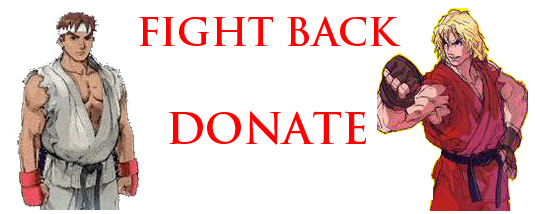
© All material Copyright 2007 by Bill Weintraub. All rights reserved.

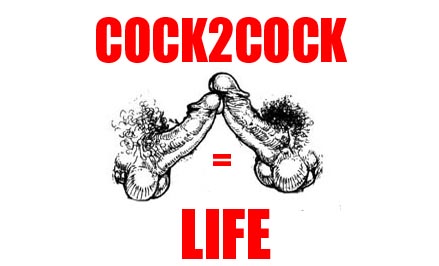
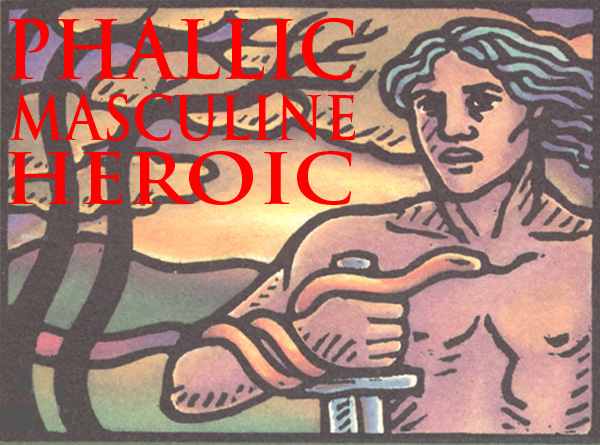



AND

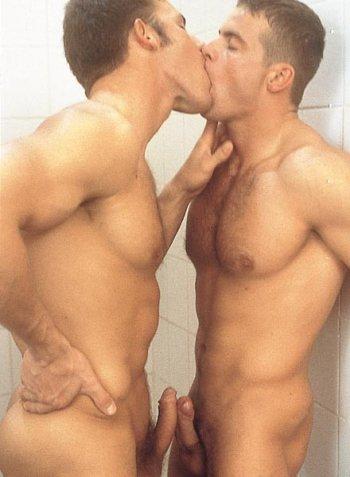
Warriors Speak is presented by The Man2Man Alliance, an organization of men into Frot
To learn more about Frot, ck out What's Hot About Frot
Or visit our FAQs page.


© All material on this site Copyright 2001 - 2010 by Bill Weintraub. All rights reserved.
